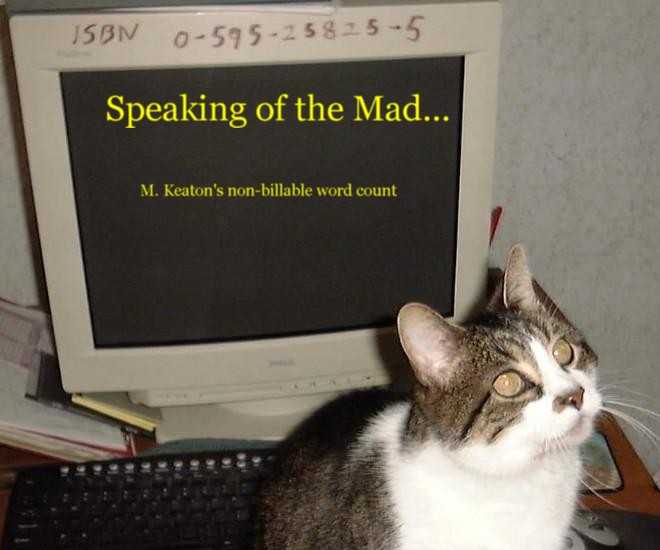Friday, May 15, 2015
On Skepticism (Part 3)
Let me tie this all together by addressing the typical skeptical attacks on "pseudo-sciences" like psi, dowsing, and, increasingly, some aspects of quantum mechanics itself.
Note: Bear in mind as I do that a clash of philosophies is a clash of worldviews. I obviously have deep-seated views and vested interests on the subject. So does the other side. There are an entire host of psychological factors at play here. Because I know my own bias and recognize that I have it, I strongly encourage you to look into the subject yourself if anything I've said piques your interest.
Now, on to the common rhetorical points of the skeptical argument seen from the perspective of skepticism as a philosophy rather than an intrinsic part of science.
"There is not one shred of evidence…" Of course there's evidence, even for the most specious of claim. The question is how defensible and reproducible is the evidence.
"Anecdotal evidence is not evidence at all." It's called a case study. Unless you're willing to throw away the entire field of medicine (and most other life sciences for that matter), this is a dishonest critique. In fact, any data collected before the advent of automated recording is anecdotal, since it was processed through human researchers. Moreover, since most people do not look at raw data but rather the processed data presented in research papers, the overwhelming majority of data could be considered anecdotal. There is, however, a strong need for skeptics to discredit anecdotal evidence--the bulk of human history is a body of evidence. If this mass of evidence is allowed into the discussion, simple mockery and dismissal of the inconvenient becomes much more difficult. This is especially relevant in consciousness studies.
"Extraordinary claims require extraordinary proof." Not to science. Science says data is data. Deciding what is extraordinary is a subjective act. For example, what level of extraordinary proof could possibly support the contention that the entire universe arose as a point-mass of probability from a quantum foam of unknown origin which then exploded into all of existence in a matter of picoseconds, before all known laws of physics suddenly altered and have remained constant to this day, eventually giving rise to life against all known laws of probability? I'd need to see more than a pie-chart to buy into that one.
"There may be some results but if you look closely, it's really all fraud, bias, and/or poor experimental design. And what about the 'file drawer' effect?'" Wherever there are humans there absolutely is fraud, bias, and mistakes, but why should we assume this only occurs in areas outside of establishment science? Remember Millikin? The history of science is rife with all of these. But science, Popperian science, rectifies these concerns through independent replication. In many areas labeled 'pseudo-science' such as psi research, the constant pressure of skeptics has actually resulted in an interesting phenomenon: the 'fringe' studies now have more scientific procedural rigor than mainstream science. Most people don't know this because it's a lot of work to keep up with ongoing research if it doesn't overlap with their daily life, which is why we rely on experts to filter information for us. Unfortunately, this also makes us vulnerable to Kuhnian consensus and skeptical broad brushing. The 'file drawer effect' is the accusation that only the 'good' studies get published and the others vanish into the bottom of a file drawer. This happens in everything but, again, it's not common and the para-science community is very conscious of it. Because of this, it is common practice, when presenting data, to calculate the number of failed studies that would be required to invalidate the observed data. As more and more data has accumulated, in many fields, there now simply are not enough file drawers in existence to bury enough data to invalidate the results.
"I don't need to look at their data to know that it's wrong." This is a biggie. It is an admission of arguing from ignorance, and of presupposing the answer before examining the data. It's not scientific, it's not honest, and it's not a very smart thing to admit.
"I don't need to waste time and effort doing counter-studies." Then how, pray tell, can you then claim that the data is invalid? Oh, right, I'm thinking like a Popperian. In the Kuhnian world, it's about consensus and social activity, not falsibility and data.
"Science has already reached a consensus on this matter. The real question is, what psychologically is wrong with you that you cannot accept the data?" Attacking the messenger rather than the message is an old rhetorical trick, but it not science. There is a field of psychology that studies this very effect and it's quite interesting. And, yes, there are psychological factors that do make it impossible for individual researchers to objectively see the data staring them in the face. But this is the case for all humans, begging the question, "Why are skeptics never skeptical of skepticism?"
"Statistical analysis is a slight of hand trick, not a valid way to evaluate data." Yes, I have actually had this one thrown at me. It's a confusing statement. If I don't use the basic tools designed to analyze data (i.e. math), what am I supposed to use? Statistics can be manipulated and abused like everything else, but how does that invalidate the tool? Especially since the same analytics are used for mainstream science but no one is challenging their use there.
"Negative effects (like psi-missing) are not effects." This statement shows a fundamental misunderstanding of science. If I am testing your drinking water for the presence of cyanide, I don't keep testing until I find some. Not finding something is every bit as valid as finding it. Using this argument is kind of like not understanding what zero means. Psi-missing, where the argument usually crops up, is the phenomena where some people actually score significantly below chance on Rhine cards and the like. Ironically, these people tend to be those who enter the experiments with a pre-stated bias against psi and/or a professional interest in disproving it. To say that below chance results are different from above chance results is like administering a set of vision tests to a group of people and then calling the blind guy a liar for not seeing anything.
"There might be something here but whatever it is, it's not (whatever is actually being suggested)." I sometimes feel this statement may sum up Ray Hymen's entire career. He's a prominent skeptic who has been employed by the government to review controversial data. He tends to reach conclusions like this a lot. It is a form of ignoring the nose on the front of your face because you do not believe in noses. It is not a new argument: rocks do not fall from the sky because there are no rocks in the sky. Another way of looking of this argument is as a kind of 'buy now, explain later' agreement. It is the skeptic saying, "Yes, there is clear and compelling data here. But you're still wrong and I am certain that someday the consensus under the current paradigm will provide an explanation that does not force me to consider the validity of your crackpot ideas." I may be a crackpot, but data deserves an honest consideration rather than dismissal on religious (scientism) grounds.
"It's too complicated and you fail to grasp the subtleties involved. There's plenty of evidence and if you knew anything about it, you wouldn't be asking such an uninformed question. (Subtext: You're too stupid to understand so I'm not going to waste my time answering your question.)" Again, no science in this objection at all. From a personal standpoint, I maintain that it is irresponsible to mock someone as ignorant and then fail to provide them with an answer. Many things are complicated and subtle. To say that about a subject is meaningless. If you hold yourself to be an intellectual that understands all that complicated and subtle stuff, you should be able to either answer a simple question—the uninformed, after all, can't be asking that complicated a question, can they? They're not smart enough—or, at the very least, be able to provide a bibliography for them to start to learn and understand. But that's not science, that's a philosophy of education. At least give the honest answer, "I don't have enough hours in my day to deal with idiots like you." Insulting, yes, but honest.
"Taking X research or subject seriously is really just letting Y special interest group further their agenda." The most common current version of this is, "We can't allow an open discussion of intelligent design, irreducible complexity, or flaws in the fossil or genetic record because it's all just a smokescreen for the evil, ignorant creationists to poison the minds of our children." This is a common argument, but it doesn't even come close to being a scientific one. Science is about data: show the data, let it stand on its own. If you don't want to let people be exposed to conflicting data or to examine your own data too closely, what are you afraid of? This leads directly to, "I'm not hiding anything, I'm just trying to keep us from wasting valuable time debating the obvious." Allocation of resources is not science, it's philosophy. You're making a subjective decision about what to present and what not to. Whether you're right or wrong, it's still not about science at this point and it's dishonest to pretend otherwise. This line of discussion is about protecting and promoting a worldview. It's also irresponsible scientifically because it presupposes that the data is invalid based on who is providing it. Data stands alone. It also presumes a false dichotomy. If, for example, I think there are parts of the evolutionary theory that don't stand up to scientific examination, that does not automatically mean that I'm a supporter of a rival theory. And even if I am, that does not mean that my objections, if they are based on data, are invalid. Again, I'm not stating whether the argument is valid, merely that it is not a scientific argument, as many would lead you to believe.
"The effect size is too small to be relevant. The signal-to-noise ratio is too low to be interesting." This one makes me very angry. It's not science because science does not engage in subjective decisions about small and large. It's barely an engineering argument, if anything. It ignores the history of science and the fact that most effects are small when studied and then the effect increases once we learn how to harness it (think about electricity, magnetism, and nuclear forces if you need some recent examples). More to the point, it is a selfish, spiteful argument. For instance, the effect of distanced healing techniques such as prayer is over three times larger than the effectiveness of using daily aspirin to prevent heart attacks. Both are 'small' effects but, since aspirin fits the accepted consensus, it's a common treatment while prayer and the like are marginalized. But let us go further: let's assume the effect size of a given alternative medical treatment is tiny, say 0.001%, and let's even assume that the effect size would not be increased by further applied research. This "irrelevant" effect could mean the difference between life and death to one person in one hundred thousand. So, how many people are you going to let die because you don't think this effect is 'interesting'?
So, one eventually asks, what is it that skepticism is afraid of? There is a vein of the age-old "we know everything so don't threaten our comfy chair with new stuff," but most of the attacks are against any sense of meaning in existence. A quick examination of skeptical literature and especially their magazines reveals a fairly consistent bogeyman in skeptic's world: teleology. Teleology is the fancy word for the idea that things have a purpose, that there is a Why as well as a What. Science as a tool can tell us what something does and how something works, but it cannot tell us why something is.
Skepticism as a philosophy would have us believe that What and How are the Why—there is no purpose, no meaning, only bare existence. This is why the favorite whipping boys of skeptics are consciousness (especially anything implying that it exists above and beyond the mere chemical interactions of the brain), anything that implies life separate from the base physical processes, and—most especially—religion. This stance is blatantly intellectually dishonest. After all, if we are indeed deterministic machines, why are you spending so much time and effort arguing about these things at all? The meat computer in my skull can't help it, I'm physically incapable of hearing and acting on your arguments, and none of it matters anyway. The very act of protesting against these things shows the validity of at least examining them.
Again, to be very repetitive at this point, these are all philosophical differences that are not science, and it becomes rapidly apparent that skeptics have no faith in the validity of their philosophy. The religious person believes that their truth is sovereign and will win out under honest examination. The Popperian scientist believes that the rigors of experimental analysis will eventually lead to correct (or more correct) theories and is content to let the data settle the discussion. It is the Kuhnian skeptic who feels the need to hide their philosophical precepts under the cloak of scientism and use, not data, but rhetoric to defend their theories. They are trying to substitute the limited tool of science for the more appropriate tool of metaphysics, hoping to claim a win by default. The result is they bring science to a philosophical discussion and philosophy to the science lab. Against the guns of belief on the one hand and data on the other, they've brought a knife…and a dull one at that.
Over the years, my personal tolerance for this kind of thing has been stretched thin. As a scientist (with over a decade of direct laboratory experience), a philosopher of science, and a literal creationist, I am more than a little tired of being told that I can't be the things I am, that I am stupid, and that I must have some kind of severe mental defect if I believe in all this. Science seeks truth about the natural world through rigorous examination; religion provides me with the framework to understand the spiritual world around me, and since I am a Christian, I follow a reasonable God; and a proper understanding of the philosophy of science tells me that these two things are not only not in competition with each other, they are complimentary studies that inform and support each other.
Subscribe to:
Post Comments (Atom)





















No comments:
Post a Comment